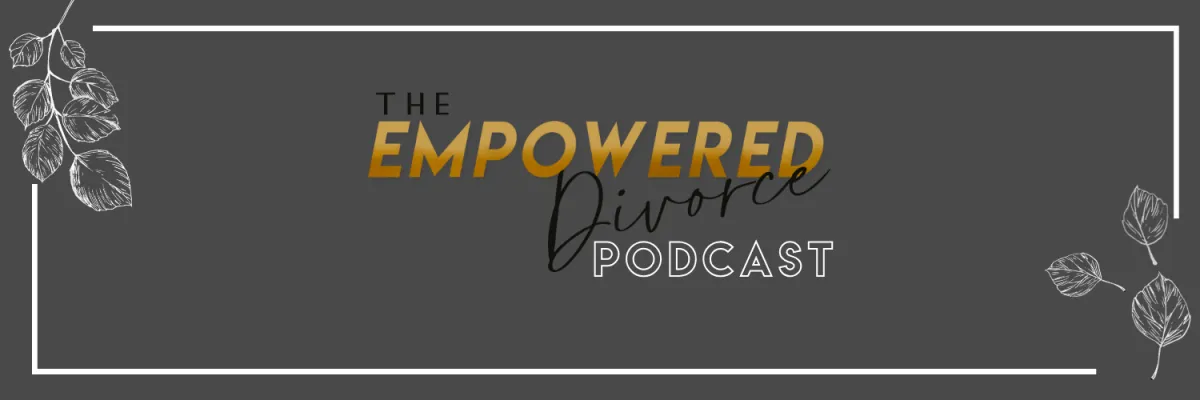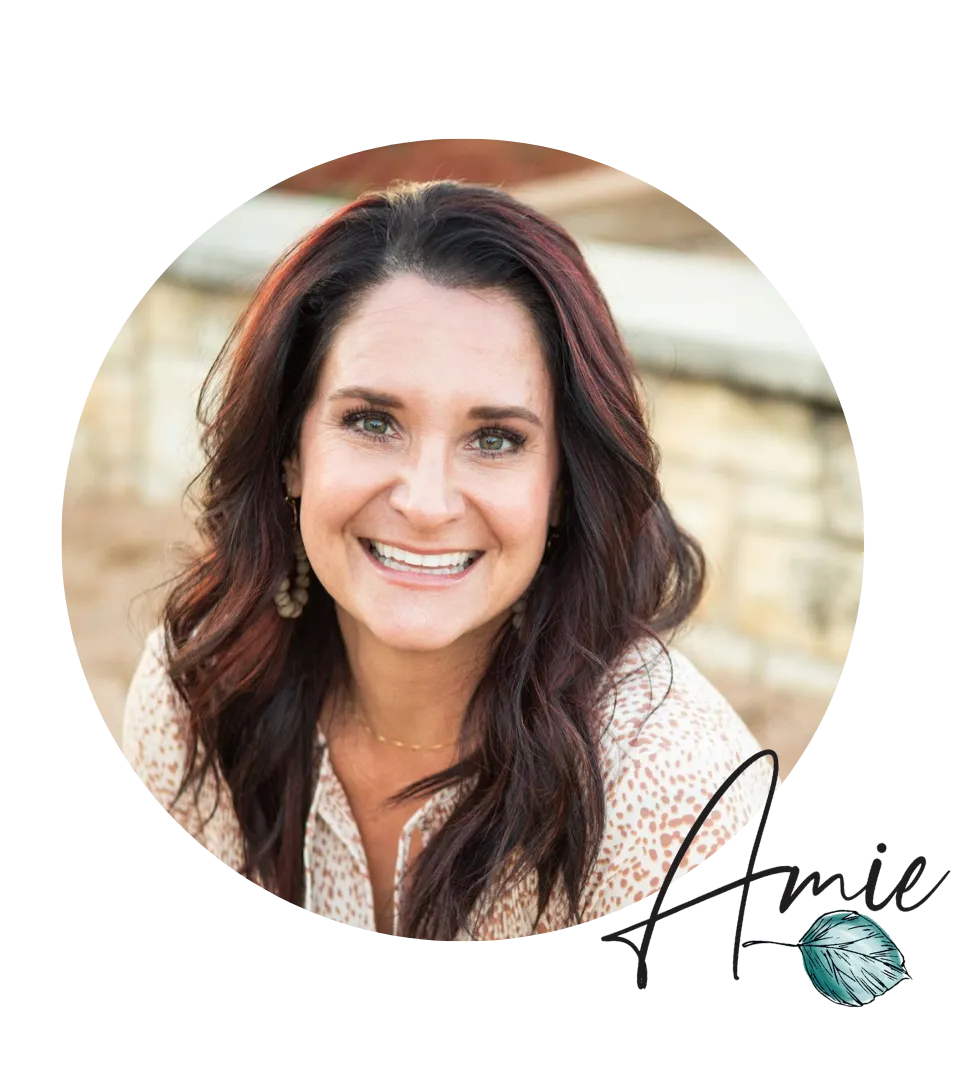
5. When Survival Mode Gets A Little Too Comfortable: Healing from Betrayal Trauma and Divorce
"Even when it would seem to the outsiders looking in that we were ok, I was waiting for the ball to drop again. I was constantly in panic that I would find something out again around his addiction or affair, this constant state of instability was my life. And because I was not aware of or had skills of emotional regulation, and I wasn't aware that I need to self care and focus on me and heal me and have boundaries, so I was participating in the cycle of abuse and unhealthy by not self regulating by not having healthy skills to cope or heal."
Do you resonate with this? If you experienced this kind of survival mode in your marriage, and then experienced a difficult divorce, you have probably become very "comfortable" in survival mode. So slowing down, stopping, and feeling a sense of calm can feel weird and wrong.
Tune in today and learn how this might be impacting you and how to move from survival mode to thriving mode. You will get specific tools to begin practicing today that will help you shift into a more empowering divorce.
Read Full Transcript
Hello? Hello. My amazing listeners.
Thank you for joining me today on the empowered divorce podcast. All right. We're talking about survival mode today, and there's a piece in here that I'm really excited to share with you because it's something that I don't think it's talked about, but it's definitely experienced that. I know I had, and I know a lot of the clients I work with have.
I see this piece show up a lot. And can keep a lot of women going through divorce, , navigating life after divorce, it can keep them stuck. So first of all, When you experienced betrayal trauma, your body goes into survival This means your prefrontal cortex turns off that part of the brain that solves problems sees options, that long-term planning, analyzing kind of thing. Okay. That part of the brain shuts off.
Because it's where it works to slow. In dangerous situations and. And so your brain starts to function from the amygdala, the hind brain, the part of the brain that keeps you alive. The part that senses threat. And then sends out the alarms of danger to just about everything at that point. That part of the brain.
Becomes bigger after trauma. And it's reacting. Impulsive to self preserve. Hence survival mode. So when you find out that your partners betrayed you, you go into survival mode. You might, you might recall when that when you first found out something, a little discovery or disclosure, And now you become, you became hypervigilant or started policing his every move, worried.
Like if you leave him alone or if he goes on a trip, what if he runs into the woman? He had an affair with. All of those, whatever your brain is on high alert to anything that he does or doesn't do, this is a way to survive. And you might recall how exhausting that was. When you're in survival mode, your mind and body are just that exhausted.
You have a lack of focus, things are foggy. It's hard to complete things. Finished activities. You find yourself forgetting. More than usual. More than, than the mom brain. Right? So you stop, you stopped taking care of basic needs, perhaps even become impulsive. , I know a couple of clients are compulsive shoppers.
, I was a compulsive eater. Just doing things that you normally wouldn't do are all part of That survival. Response. One of the reasons I wanted to start a podcast on divorce, but divorce after betrayal is because of factors like this. This experience of trauma is not insignificant. You are not going to just get over this because you got divorced. In fact, divorce will add another level of trauma.
If we are not aware and actively taking steps to move into a place of empowerment. So living in survival mode. For years took its toll on me. I wasn't just in survival mode from infidelity and in his addictions, but financial survival mode, as well. And maybe some of you can relate to that. He was caught in Bisley money from his company and we lost everything. I had to sell everything. I could. We lost a car home business, health insurance.
All that stability I had was gone. So I was definitely functioning in survival mode in so many different areas of my life. Even when it would seem to outsiders looking in that we were okay. I was waiting for the ball to drop again. I was constantly in panic. That I would find something out again around his addiction or affair that something else would happen, and in his new job and sure enough, it did.
He was now being, let go from a job a few years after he lost the business. This constant state of instability was my life. And because I was not aware. Or. Had skills of emotional regulation. There was no one talking Trauma. In fact, it wasn't named that until I think just 10 years ago, it started to become a thing.
I had no therapist telling me that I was experiencing PTSD and I wasn't being told that I needed self care and to focus on me and heal me and have boundaries. So I was participating in the cycle of abuse and unhealthy. By not self-regulating. By not having healthy skills to cope or heal. So years of living like this in this state of high alert, high functioning overfunctioning was my normal.
I was functioning well to an outsider. Very well. But my insides were shutting down. When I finally find my way out of the marriage and find a way through divorce process. And now I'm out now and living in my own place. Now that I'm, I have an opportunity to calm down some of those parts that are in high alert.
Have an opportunity to feel a little bit more of the healthy control, in my life, I noticed myself doing something. And this is what I want to share with you today. I noticed that because I had lived in survival mode for so many years. Because that was my normal for so long. Once I moved out of that space. I no longer had a reason to fear as much because.
I was not in a relationship with that man anymore. And like I said, I had more opportunities to self care and to become emotionally regulated. I had a new environment. I didn't have to be on such high alert in a constant state of worry and fear about my partner yet. That space did not feel normal. The space of calm, quiet, and slower felt wrong to
And what I realized was that I was subconsciously looking for alerts drama. With my ex still. Whether it was him or his new wife at the time. Any time he did something or didn't do something or did something that was outrageous or asinine. I jumped all over it.
I talked about it with my friends and my mom and was like, oh my gosh, can you believe you did this When he wouldn't pay child support for the six months in a row or I'd be so irate over it. Now. Yes, it's maddening. And I'm not saying that it's not something to be upset over, but I wasn't just upset. I'd focus on it to the level of throwing my central nervous system back, like in survival
Does that make sense? So when things came up that were frustrating or wrong, like when he violated a boundary, rather than staying in my bubble and controlling what I can control or dealing with my emotions in a healthy way. I found a familiarity in high levels of stress and survival mode, because that was my norm for so long. I knew how to function
When I could vent to my friends about the absurdity of what he was doing, there was a sense of control validation, and sometimes justification. And it ignited an energy. That felt more normal than the energy that came from calm, centered, and stable.
So interesting. Right. I had no idea that I was doing this. It really wasn't conscious. And that's why I want to bring it up because I don't think this is something that maybe we recognize. And certainly I haven't heard anybody talk about it.
I had no idea that I wasn't living life to its fullest, that I was just getting by. Because, I mean, it felt better after divorce in a lot of ways. I didn't have a lot of those stresses that I had with my ex and yet. I just was looking for other things to stress out about. Because that's what I knew. I knew how to react.
I knew I could react quickly. And. What I interpreted as even logically, but what I wasn't doing was responding. I was reacting. And man, I knew how to do that.
That's where I lived for years.
Responding. Meant taking time to assess the situation, be aware. Slow down. Think things through, get curious, make conscious choices from a place of empowerment. Rather everything. Feeling just so urgent. Everything felt like 9 1, 1.
And the interesting thing is I had zero energy to handle 9.1. So I was like, right. It's. It sucks the life out of you to live, in this state.
But I felt like all the decisions were big, old mountains decline filling out kids' school forms. Just, , when they'd come home and you have to go through their folders and. Fill out paperwork and sign them up for crap. All of that felt like a mountain. It was all. So big. My brain took all of these things and it was just like, oh my gosh, that's so big. That's so huge. That's so much.
It was doing that with everything still.
Survival mode. Doesn't give you access to your power because you're not functioning from that place of clarity or choice. Or anabolic energy, or functioning, from that central nervous this is something that, again, I don't think a lot. Are willing to talk about it. It can be embarrassing. I think sometimes. And.
Certainly leaves us open for others who don't understand to maybe judge.
But that's why women need women and those who understand need to speak out and. You're not crazy. You're not weak. You're not a drama seeker. You're just needing to practice tools to help you find your healthy spot, your new normal, and move from survival mode to thriving. This triggered survival mode, put some tricky energy into the body that makes it pretty challenging to see any way forward.
Without feeling like everything's going to collapse, right. So it seems easier. To keep living in this state. Slowing down. Moving out of survival mode can feel very disorienting at first. I just want to validate that. And it can feel like you're even moving backwards in your healing. Because when you slow down, when you start to get emotionally regulated that central nervous system back online, you're going to start seeing things that you've not been looking at about yourself, your body, your emotions, all these parts.
That haven't been looked at. And so it's going to feel big. But that doesn't mean wrong.
Okay. I really want you to hear me with that. When you start to slow down because you're moving so fast. You're moving from that. That amigdala that survive mode. Where that part of the brain moves faster. So when you slow down, You're going to see things that you haven't been really looking
Because that's not that part of the brain's
It's just thinking I got to just survive one, one thing to the next, right? We're not longterm planning. We're just seeing things right in front of us. One foot in front of the next, get to the next, so that we just stay alive and don't die. So when we slow it down, And when you haven't slowed down in a long time, I'm talking years, some of you decades, you know who I'm talking about.
Can you see, like give yourself grace here. Can you see why that would feel so.
Abnormal and scary to your brain. It's like, whoa, whoa, whoa, hold on. We have not functioned like this. We know how to function in survival. We've gotten really dang good at it. What are you doing? You're messing things up again here.
Like, it just makes sense why this is going to feel weird. And when you slow down,
All these things that we weren't looking out because we're moving too fast. Now we're seeing. These parts, these feelings, these hard things have always been there. Now you're looking at it and it's like, whoa. That feels too intense and too big. And so it can feel weird and wrong and not normal.
And I'm I'm air quoting here, like normal. We can then go looking for that high intensity adrenaline that comes with the drama of a situation.
We can go look for it. And. Keep it rolling longer than necessary, or even create it. Because living in that space has been familiar.
And for those of you who've gone through. Maybe a difficult, intense divorce. Then this is just making my point all the more. You've lived and experienced this survival So
So living in a calm. Still. Quiet. And healthy control space is going to feel abnormal. It's not going to feel right right now.
The same thing happened when I went on anxiety medication for panic attacks. Going from such high levels of anxiety and living there for so long. And learning how to over-function became that normal for me, I learned how to cope and navigate life in that space. So when medicine head and my high unhealthy levels of anxiety and trauma were calming down where my central nervous system was getting a little bit of a break. It felt weird.
I felt like something was wrong with And then I was perhaps doing something wrong like that. Not enough thing came up. Those thoughts came up. Life felt slower. And so my brain offered me thoughts. Like you're not working enough, you're not doing enough. You're lazy. I'm working fast When in reality, I was moving back into a healthy state of functionality.
And that just felt weird. It felt like I was like, life was in slow motion now. And it was so born to me, like it was like slow it down and. I didn't like it I will just be straight up. I did not like
And I didn't like it because my thought was. I'm doing something wrong here. This doesn't feel right. I'm not moving fast enough. So what's going on here.
After a prolonged time and survival mode. I didn't give my body time to rest and recharge. And so that is leading to burnout.
And you're now going to have underlying mental, emotional, and physical symptoms. The sentence that you're most likely not seeing right now. Because you've been ignoring it. When you slow down, you're going to see the symptoms.
And remember seeing the symptoms does not mean you're moving backwards in your healing or that something's gone wrong. You've got to, you really have to. You really have to make a conscious effort to remember this. Remind yourself your nothing's going wrong here. I'm just seeing you body. I'm seeing you parts and seeing you emotions.
So exhaustion, headaches, insomnia, anxiety, depression, , Panic attacks. Irritability. You might have back pain, stomach pain, eating disorders., I've seen clients have like eczema, skin irritations. A lot of unexplained, autoimmune diseases. I had an autoimmune disease. All of these things.
Can absolutely be symptoms of burnout and living in survival mode for so long.
So here's what I want to offer you a few things that you can start practicing this week to help you move out of survival mode. But before I get to those, I, again, I just, I want to reiterate. That. And to the first thing here, I guess, really is to be aware. Of when you are looking for opportunities to go back into that.
Hypervigilant survival mode kind of space. Because it feels comfortable. Because it feels familiar. To your brain. You might not want to be there logically. Like ideally, logically you might realize and know that's not healthy. You don't want to be there. But remember this is you've trained your brain to be there because that's what kept you alive. Okay. So the first step really is to just be aware of when you're doing , And when you are contributing to that by. Talking about him. Bringing things up, getting in his bubble. Worrying about his life. Worrying about what he is or isn't doing. Maybe looking for, even outside of him, looking for maybe drama in other people, looking for maybe how other people are screwing you over, over causing you
Sometimes we can shift that victim thinking to just other people. And now we're looking at the whole world is against us, and we're trying to survive from the whole world attacking us. This is a very common place to get stuck in.
I just, I feel like this is so huge and important. To speak out about, and help. You recognize where this might be showing So be aware, recognize when it's showing up and please no judgment or shame here. Half the battle is just being aware. But if we start judging ourselves or feeling shame about this, we're going to get stuck again.
Try really hard to practice. Just being curious. And being aware.
Then we can step into conscious choice.. When you're aware some of the things that you can do to consciously move out of survival mode and into more of a thriving state. Is first.
Awareness second brief.
Notice your breath and slow it down. I'm talking about conscious breathing. I didn't realize how much I was holding my breath or breathing rapidly, which led to my panic attacks. So breathing and this isn't just like taking a deep breath. I'm talking about breathing from your belly. In fact breathing from your belly and not your chest is going to help you. It's going to signal that parasympathetic nervous system. Which relaxes and detoxes the system. Your chest breathing is tapping into the sympathetic system, which is the fight flight response. We want to bring your cortisol levels down here and that's going to happen when you belly breathe. , Some of you. Might've heard me talk about this before, especially if you've done my body love class, but. One of the things that. Kept me from doing this was like, I hated my stomach. I had a lot of negative thoughts around my stomach. And when I belly breathed, it expanded my stomach. So I noticed that I was resisting that.
And because I didn't want my belly to expand. And so that contributed to a lot of my breath holding. Cause I was always like, Sucking it in.
I mean, let's be honest. I did not want my belly like to feel, I didn't want to feel my belly expand over my pants when I belly breathing. So that., it sounds so silly, but I honestly, that kept me from doing this work. And so. Oh, I had to get over myself on that. And I just want you to know you're not.
If you're feeling that, but it is really, it really is important, to start correctly breathing. . Consciously belly breathe, but very, very important to, to signal that parasynthetic nervous system. Okay. The next, listen to your body. Body scans, which I will do an episode on this alone, but taking note to reflect on your body and what your body needs is so important here.
Stepping out of the survival mode is going to feel so different and your body is going to respond to so different. It will signal more sleep. More. Just maybe laying, laying down, resting, sitting down, quiet, more saying no more of doing things that feel good to your body. Healthy healing things. Meditating, reading walks, yoga, stretching.
Being aware of your body right now is going to help you shift out of trauma response state. And being in present state.
Okay, next, be aware of And give it space to speak. And.
Then tell it where you want it to go. There are so many fears that you have most likely been holding onto we're battling with for years. Fears that you might still be holding on from the marriage and trauma. In the marriage where you're still afraid of his reactions, his responses. Are you still afraid to tell him? No. Are you free to hold a boundary? Are you afraid?
What he will or won't do, maybe now you're afraid of being alone and providing and your children. A new lifestyle, fear of dating, like. All of these fears. Are keeping you in survival mode. So when you're divorced, part of healing is stepping into your power and taking your life back and letting go of his.
His thoughts, his feelings, his life. So right now, be more aware of those spheres, write them down, get curious about them. And like I said before, this isn't a time to feel badly or criticize or judge that you, That you have all of these fears. It's just again, noticing and being aware. So writing them down so that you can create some separation between yourself and the fear.
And. See, oh, these are the fears that are coming up right Fears are something that you can bring to your coach and your therapist
So have them help you play out that fear if you can't do this by yourself, but it's going to help you really determine. If you really need this fear, like if there's something that you need to do about it, or if you can let it go. I don't like telling women not to fear because I don't think that's totally possible.
I look at it as being aware of it and in charge of it.
You want to be driving the car? Not letting fear behind the wheel, if you can ride in the back seat, if it needs to. But we just don't want to hand over the keys.
Okay. The last thing to consider here is to practice creating your own
I know. That you and you alone, get to create that for yourself. You got to show up for yourself in a big way No one needs to save you. And you don't need to be saved. You have your own back and God's got your back and that's enough. We have to start here. And here we can find. Others who can also contribute to the safety bubble.
That's a bonus. But. We are not going to solely rely on that. As our primary source of safety. Okay,, this is your business. This is what you have power and agency over. So create specific sacred spaces for you to feel safe. Hopefully, this is your living space. Maybe you start smaller.
Maybe start in a bathroom or a closet, one space that you can go and feel safe. I use the word sacred because this space needs to be dedicated to your healing. And purpose of thriving. Purpose of releasing these survival thoughts. And stepping into thrive. Of being present with you in whatever state you're in without judgment or shame.
And I think that's a sacred work. I think it's such an important. Individual work.
This space will allow you to access more clarity, grounding. So that you can make conscious choices from a place of empowerment rather than survival.
Okay. One more. Honestly, I have like a ton. I don't want to give you too much or you're going to stop listening to me. Okay. But just one more thing that just came to my mind. And I think it's important And that's asked for help. Reach out and ask someone for help.
I'm here to help you. Others are trained to help in these situations. If you don't have someone safe that you can feel like you can trust to hold sacred space for you to heal them, reach out to I can offer resources, but lean into asking others. Who will hold sacred space for you for help, because you don't have to do this alone.
You do not need to do this alone.
And I know that when you have other supporting you along the way, you can move into thriving faster. Now it's not a race. But it will move
So ask someone for help recognize when you need And drop again, drop a judgment, drop the shame and no. That it's okay. You don't have to hold up the world on your shoulders. You don't have to do everything on your own. You don't have to hold up all of, the responsibility of your children on your own.
And when it's not safe to reach out to your part, your ex. For help. Then reach out to others for help. Because other people can step in and help your children. In ways that you might not. Be able to, or they might not want you to, and that's okay.
Being willing and humble enough and open enough to ask for help. We'll help you thrive.
It really, really well. I am so grateful for those that stepped in and helped and supported my children in big Ways that they still honestly have no idea their impact. My children will still talk about key people in their life that stepped in. And helped. And it's such a blessing. It is. To this day still bless their life.
So I think that's a huge one to consider and practice. You are not broken and survival mode. And how you've been living there for so long is nothing to be ashamed of. Or be upset with yourself for your parts have done an amazing job at keeping you alive. You survived. You are alive. You are capable of thriving.
You don't have to live in this space anymore. But I want you to know that. You did your parts have done a beautiful job?
Your heart may be broken, but you are whole incomplete and enough just the way And as you practice these things to move out of survival, you're going to start seeing you and showing up for you in the way that you've needed to all this time.
So be patient with
As your parts get used to you, seeing them, they might freak out a bit. And think that you're going to go away again. So give yourself some grace here.
This is that. That self-trust piece also. Where you're showing your body, your parts that you're seeing them now, you're going to show up. They can trust you.
And that's a beautiful journey. You've got this. And your tribe of women listening and going through the same thing. Are with you too. Thanks everyone for joining. See







Facebook
Instagram
Youtube